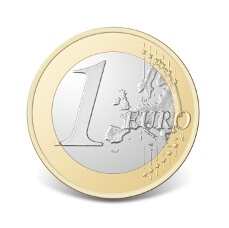The euro was mixed today, rising versus the US dollar and the Japanese yen, but falling against the Great Britain pound and the Swiss franc. The currency continued to receive support from quantitative easing tapering expectations.
Peter Praet, European Central Bank chief economist and an Executive Board member, voiced his opinion earlier this week that monetary stimulus should stay in place. He argued that the current strong economic growth depends on it:
We are undoubtedly experiencing a solid, broad-based and resilient economic recovery that is contributing to a narrowing of the output and unemployment gaps, but a seeming disconnect between growth and inflation remains. The baseline scenario for inflation going forward remains crucially contingent on very easy financing conditions which, to a large extent, depend on the current accommodative monetary policy stance.
Yet another Executive Board member Sabine Lautenschläger argued today that the ECB should decide “now” when to start QE tapering. She said that, while inflation is not at the central bank’s goal, it is not far:
There’s no doubt that monetary policy will return to normal. The question is when. The conditions are all in place for inflation to reach a stable trend towards our goal.
It seems that economic data supports the latter view as wage inflation accelerated in the eurozone last month. Eurostat reported on Friday that hourly labor cost rose 1.8% in the second quarter of 2017 after increasing 1.4% in the first quarter. It was the fastest growth since the first quarter of 2016.
EUR/USD rose from 1.1918 to settle at 1.1945, touching the high of 1.1986 intraday. EUR/JPY gained from 131.38 to 132.39, reaching 133.03 during the trading session — the highest level since December 2015. EUR/GBP slumped 1.2% from 0.8893 to 0.8790.
If you have any questions, comments or opinions regarding the Euro,
feel free to post them using the commentary form below.



Be First to Comment